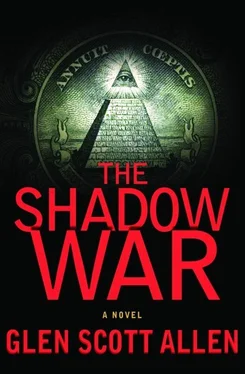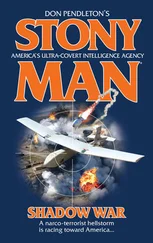Glen Allen - The shadow war
Здесь есть возможность читать онлайн «Glen Allen - The shadow war» весь текст электронной книги совершенно бесплатно (целиком полную версию без сокращений). В некоторых случаях можно слушать аудио, скачать через торрент в формате fb2 и присутствует краткое содержание. Жанр: Триллер, на английском языке. Описание произведения, (предисловие) а так же отзывы посетителей доступны на портале библиотеки ЛибКат.
- Название:The shadow war
- Автор:
- Жанр:
- Год:неизвестен
- ISBN:нет данных
- Рейтинг книги:5 / 5. Голосов: 1
-
Избранное:Добавить в избранное
- Отзывы:
-
Ваша оценка:
- 100
- 1
- 2
- 3
- 4
- 5
The shadow war: краткое содержание, описание и аннотация
Предлагаем к чтению аннотацию, описание, краткое содержание или предисловие (зависит от того, что написал сам автор книги «The shadow war»). Если вы не нашли необходимую информацию о книге — напишите в комментариях, мы постараемся отыскать её.
The shadow war — читать онлайн бесплатно полную книгу (весь текст) целиком
Ниже представлен текст книги, разбитый по страницам. Система сохранения места последней прочитанной страницы, позволяет с удобством читать онлайн бесплатно книгу «The shadow war», без необходимости каждый раз заново искать на чём Вы остановились. Поставьте закладку, и сможете в любой момент перейти на страницу, на которой закончили чтение.
Интервал:
Закладка:
Nikolai nodded. "Yes. What is here is, I think, tunnel next to silo, for equipment. There is hatch at top, can be opened from outside."
Benjamin forced a smile and an optimistic tone. "Then all we need is help from someone inside the complex. Someone to turn off those cameras and other things."
Nikolai turned, looked at him, laughed. "Is all we need?"
"Well…" Benjamin wouldn't give up, not now. "Do you still know anyone stationed there?"
Nikolai thought a moment.
"Well… yes," he said, nodding slowly. "Vasily Kalinin. Lieutenant Colonel Vasily Kalinin. I knew him when he was just Lieutenant Kalinin, some years my junior. Now he is in charge of security. He was good man, we trust each other." Nikolai looked up at Benjamin, frowned again. "But what we would ask of him, he would not do."
"But it is just an empty silo," Natalya said. "There is nothing there to protect."
"Let me think," Nikolai said. He walked away, then almost immediately turned around.
"Your President Reagan," Nikolai said, "used to say ' doverai no proverai, ' trust but verify. These days, little trust, much verify. Teams there all the time, from United States, from International Atomic Energy Commission…" Nikolai smiled again, but now with a trace of wickedness. "Even from newspapers. Perhaps if you knew such people…"
Benjamin returned Nikolai's wicked smile.
"And you, Nikolai," he said rather jauntily, "just happen to be looking at two very rich French journalists."
After a little more discussion, Nikolai agreed that, yes, there was a possibility, however slim, that they could reach the place designated on Leverotov's map. But he absolutely refused to allow Natalya to travel with them to Uzhur.
They argued for an hour, pacing back and forth in the church basement. Finally, they reached a compromise: Nikolai would fly on ahead to Krasnoyarsk, then take the train to Uzhur and make contact with Vasily. Natalya and Benjamin would take the train from Dubna, through Moscow and on across Russia to Uzhur-a trip that would require four days. That way, he insisted, he would have plenty of time to sniff out the situation with Vasily and determine whether there was any chance for their plan to succeed before they arrived-and before he put his daughter's life in danger.
Just in case something happened to him-he didn't specify the "something," but all of them understood what he meant-he gave them a letter for Vasily, a letter wherein he asked the Lieutenant Colonel to give them whatever help he could, in good conscience, offer.
"I wrote in note, nothing you ask makes risk for Russian Federation," Nikolai said. "He would not violate his duty. But," and he winked, "Vasily is also not hostile to vziatki… to bribes, if amount high and risk low."
Nikolai also explained that, regardless of their credentials, none of them would be able to enter the "military" Uzhur, and, since there were no hotels in the civilian town, he would contact one of his old friends there and ask him to put them up for a few days. He gave them the phone number of a Boris Silma, a man who had served with him and fallen in love with the wild territory and retired to Uzhur.
"Boris hunts, raises rabbits, smuggles vodka into China. He will welcome you. Especially if you bring dollars."
Benjamin suggested purchasing cell phones for all of them so they could stay in touch. Natalya and Nikolai looked at each other, laughed.
"Unless we stay in Petersburg or Moscow," Natalya said, "they would not do us much good."
"And around Uzhur," Nikolai added, "there is, what you say, blanket. Only military frequencies work. Besides," Nikolai said somewhat darkly, "we either meet there, or we don't."
They left Ratmino separately, Nikolai to make his phone calls-but from Olga's, not his own apartment-and Benjamin and Natalya to gather their things from the Dubna Otel, then take a taxi to a smaller train station outside of Dubna.
Two hours later, Nikolai met them at the small station, where the Dubna-Moscow train would stop briefly; it wasn't really a station, but rather a mere concrete platform with a rusted iron roof.
Nikolai embraced Natalya, kissed her on both cheeks, and told her to be very careful. Then he took Benjamin aside and gave him a small bundle.
"What's this?" Benjamin asked.
"Insurance," Nikolai said. He opened the bundle.
Inside was a compact black automatic pistol with a brown hand grip. A small five-pointed star was embossed in the middle of the grip.
"Is Makarov," said Nikolai. "Good weapon."
Benjamin looked at Nikolai with a mixture of surprise and horror.
"Nikolai," he said, "are you kidding? I've never used one of these. I'm an 'academician,' remember?"
"Is easy," Nikolai said. He quickly showed Benjamin how the safety operated, how to remove and check the clip. Then he rewrapped the gun and gave it to Benjamin.
"I would never get it on plane anyway," he said. "And I feel better if I know you have it."
"I'm not sure I will," said Benjamin. But he stuffed the bundle into his parka pocket. Then he shook Nikolai's hand.
"Udachi!" Nikolai said. "Good luck, Mr. Levebre!"
"And good luck to you, too, Nikolai," answered Benjamin.
Then he followed Natalya onto the train.
CHAPTER 46
Benjamin had of course heard of the Trans-Siberian Railway; he just never imagined he'd actually be on it, journeying across three thousand kilometers of Russia to a secret Russian rocket base in Siberia-all so he could perform a supremely unlikely act of burglary.
But those four days of train travel gave Benjamin a better idea of just how vast a country Russia truly was.
Once east of Moscow, the landscape became covered with seemingly limitless pine forests. When there weren't forests, there were fields-immense fields of wheat and barley that stretched to the horizon. At Yekaterinburg-where, Natalya grimly pointed out, the Romanovs were executed by the Bolsheviks-they crossed the Ural Mountains, the divide between Europe and Asia. They were now officially in Siberia. When Benjamin evidenced surprise at this, Natalya explained that, contrary to what most Westerners thought, Siberia wasn't just the frozen north of Russia; Siberia was, in fact, the entire eastern half of the country.
Along the way they passed through the huge oil fields around Tyumen, with numberless red-and-gray oil derricks nodding up and down and looking like the feeding skeletons of prehistoric monsters; through Omsk, a metropolis filled with blocky, white modern buildings nestled against the Irtysh River; through Novosibirsk, Russia's third largest city, famous for its enormous, domed ballet theater, as well as its scientific facilities, both public and secret.
Most of the time they tried not to think about what lay ahead. They talked of their childhoods. Natalya surprised Benjamin by revealing that, as a teenager, she'd been a leader of the Komsomol, the Communist Youth Union. Benjamin said it was difficult to imagine her as some sort of "Commie boss."
"Oh," she said, "I was quite stern. You should see a photograph of me from that time. I look positively sinister."
"But you didn't join the Party?"
"No," she said. "By that time, the thaw of glasnost was already beginning, Gorbachev was breaking up the country, and everyone knew the Party's days would soon be over. And by then my father had made his… discoveries. We knew the truth about my grandfathers' work for the NKVD. If I had joined the Party, it would have broken my father's heart."
But Natalya was far more interested in hearing about Benjamin's history. He talked about what he considered his absolutely uneventful childhood.
"It was not nearly so exciting as living in a secret city in Siberia," he said. But Natalya seemed interested in every detail: if he'd been a Boy Scout (what she called the American Pioneers, and yes, he had, making it to Star); who his girlfriends had been in high school (only two, he'd said, which surprised her, but both blondes, which didn't); why he'd never gotten married ("Of course, because I hadn't met you"-an answer she labeled "a blatant compliment").
Читать дальшеИнтервал:
Закладка:
Похожие книги на «The shadow war»
Представляем Вашему вниманию похожие книги на «The shadow war» списком для выбора. Мы отобрали схожую по названию и смыслу литературу в надежде предоставить читателям больше вариантов отыскать новые, интересные, ещё непрочитанные произведения.
Обсуждение, отзывы о книге «The shadow war» и просто собственные мнения читателей. Оставьте ваши комментарии, напишите, что Вы думаете о произведении, его смысле или главных героях. Укажите что конкретно понравилось, а что нет, и почему Вы так считаете.












